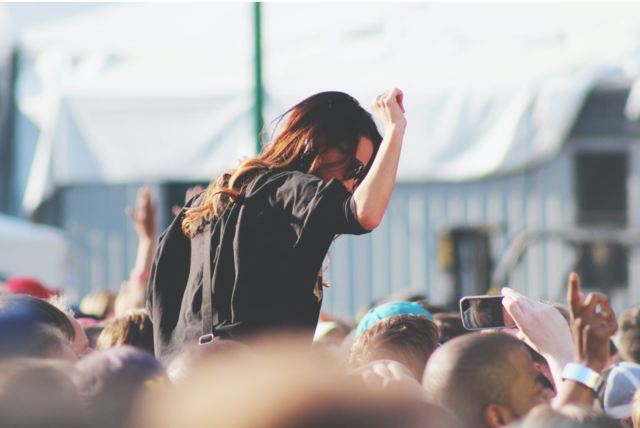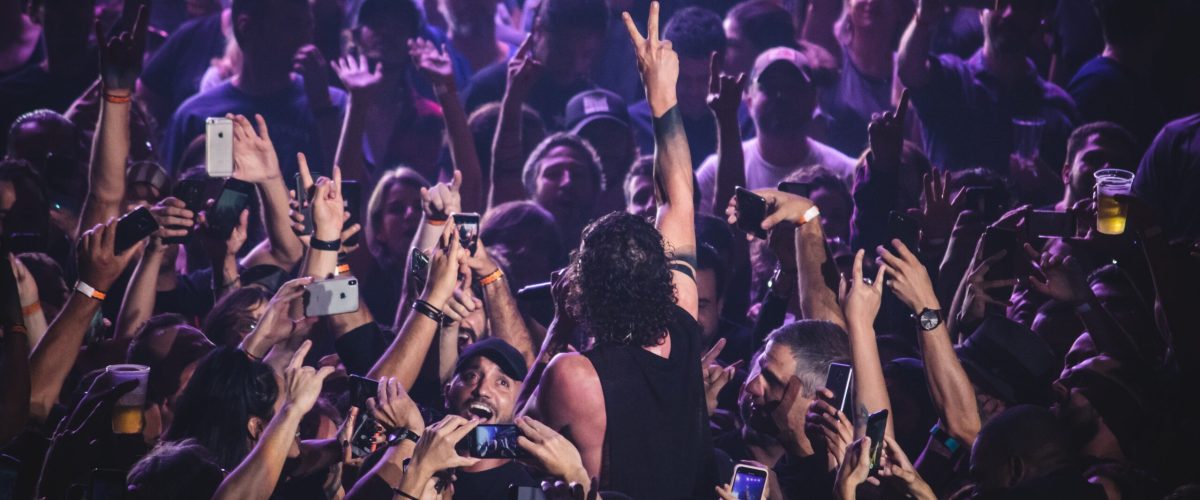Concerts are a place where people go to celebrate music and share in the live music experience together. Within recent years, concert etiquette (or rather the lack of etiquette) has made headlines for being dangerous for both audience members and the performers.
In 2021, the Astroworld Festival made headlines when Travis Scotts’ set resulted in 10 deaths and nearly 5,000 injuries due to the audience crushing and trampling each other. Between 2022 and 2023 alone, artists like Cardi B, Bebe Rexha, Harry Styles and many more have dealt with audience members throwing items at them on stage. A handful of the items thrown at the artists have resulted in injuries requiring medical attention. In the case with Bebe Rexha, someone in the audience threw their phone on the stage and it hit her in the face. Her injuries sustained from this incident resulted in needing to get stitches and later she released a picture and an update to her fans saying she is recovering.
In addition to the issue of people throwing objects at performers, there is an issue with people rushing the stage to try to get on stage with the artist. Fans have historically tried to get backstage or onstage during shows. The security team works to intercept them and prevent them from reaching the stage. Ava Max had an audience member run on stage and hit her to the point he scratched her eye.
The loss of concert etiquette at shows is leading to very dangerous experiences for everyone in attendance including the performing artists. How can we fix this decline in concert etiquette? Is there a model for how attendees should behave?
How Has Concert Etiquette Changed Between Woodstock and Coachella?
Advancements in concert production over the years

Woodstock changed how crowds experienced live shows with rotating lineups, big names performing shortened sets back-to-back and the audience piling into a field to watch these sets. Coachella, being a current day music festival, has influenced musicians to begin “experimenting with their shows, focusing on elements beyond the music and bringing in special effects” (Evolution of the concert).
Technology is a big tool used in modern day performances with LED screens, pyrotechnics, stages that have special features such as trap doors, lifts, and lights/screens built in. All of this have increased performance production values leading to an increased audience engagement and desire to see these shows. Now, music performances are an immersive experience where the crowd almost enters the world designed by the performer/creator. Such concerts have a heavy influence on the overall energy of the audience as they experience them.
Behavioral Shifts in Concert Goers
Woodstock (3 Days of Peace and Music) was an event where the audience came together to watch a list of artists perform. They connected as they all experienced the messy mud left from the rain before the 3-day show. Despite the conditions, they took part in the festival to celebrate their love for music and artists performing. Now contrast that with Coachella which has gained a lot of popularity for being known as the festival where celebrities and influencers go to post content, attend parties, network with other influencers, and see some of their favorite artists.
There are a lot of people who stand in line all day to watch their favorite performers no matter what hurdles stand in their way. That aspect of the experience that fans share is fundamentally like Woodstock. However, it is important to note that there are many other reasons people attend Coachella festival events that don’t include watching the actual music sets. Instead, they involve focusing on what they can gain out of the experience (followers, business deals or content).

It seems another shift in concert etiquette and behavior is audience members feeling entitled to behave however they want regardless of how it would affect the people around them.
For example, screaming the lyrics so loud that the people nearby can’t hear the artists singing, dancing around and taking up people’s personal space, standing in front of others who are seated so they can see the show, or talking to friends over the music and interfering with other people’s experience during the show. These are just examples of very common behaviors that have been around at concerts for decades but are getting more and more normalized due to the “I paid to be here, so I’ll enjoy the show how I want” narrative.
Summary
Some studies suggest that younger generations are more likely to display bad behavior at concerts, ignoring past concert etiquette accepted behaviors. Fans from any generation can act out at a show and cause problems to the people around them or the performers on the stage. For decades it has been a somewhat normalized behavior for women to toss their underwear on stage at a performer and it gets chalked up to them being a fan. Also, famously David Bowie was hit in the eye with a lollipop in 2004 when a fan lobbed it at the artist. This behavior has evolved into throwing phones, drinks, and miscellaneous objects which are undeniably more hazardous than pieces of cloth, but the line can seem grey to a lot of people…especially if they are new to attending concerts.
It is also important to note how accessible news and information is to us now compared to 10+ years ago. Since the introduction of social media, news and information has been much easier to reach the masses in comparison to traditional news outlets which have limited time and coverage. So, is this behavior entirely new or are we hearing about it more because of the resources we have access to now? Social media is a huge driver of information about concerts and what is taking place at them in real time. Getting noticed, i.e., going viral is a huge incentive to post bizarre or dangerous behavior on social media. The more they are shared, the more they become the norm to people who share and view these behaviors.
The Covid-19 Pandemic: Impact On Younger Generations’ Concert Etiquette

In the instance, when Bebe Rexha had a phone thrown into her face, the man who threw his phone said he did it purely because he “thought it would be funny”. In this day of age, phones are everywhere recording the artists’ performances.
Acting out towards the artist results in people getting their 15 minutes of fame. Videos of celebrities naturally circulate online a good deal. Videos of celebrities getting mad at fans during their shows will gain a lot of attention. It also creates a buzz around the idea of who did this and what their motive was.
According to an article by The Guardian titled “Bad Behavior at Concerts is Becoming Normalized, Experts Say” concert behavior is undeniably changing for the worse and it’s becoming more normalized. The events of artists being hit with objects are becoming more and more common. Industry personnel are now speaking up about this shift in behavior and artists themselves are taking time out of their shows to make announcements to the crowds stating that no one should be throwing things at anyone.
Is This Concert Behavior Here To Stay?
How can we course correct from this behavior?
Countless incidents where the audience is exposing themselves and the performers to needless hazards bring into question – why? Why are people behaving this way? For many fans it is their chance to be acknowledged by the performer. They are desperate to find a way to make an impression. What they are not considering is that they are only making a bad impression and they could risk facing legal charges, restraining orders, etc.
Artists are frustrated by the changing audience etiquette at the shows. They are reacting to these disruptive audience members and no longer tolerating poor fan behavior. Cardi B responded to the fan who threw their drink at her by throwing her microphone at that audience member. Additionally, Adele made an announcement at a show saying there is no need to throw things at performers. She put it in terms they could easily understand. We are seeing more artists standing up to their followers and fans to let them know that bad behavior is not okay, and it will not be tolerated.
Eliminating all bad fan behavior is a much larger concert etiquette issue that cannot be fully addressed at the shows directly. However, there are a few ways to go about addressing concert behavior at shows that might help keep the audience and performers safe.
Increase Security
You can station more security staff by the stage and have them take on a more proactive approach to concert fans’ negative behavior. Their sole purpose could be looking for people not adhering to normal concert etiquette and that may be ready to act out. They can take action to restrain behaviors and even remove individuals from the venue. These security staff would be an addition to the stationed security team already in place for concerts. Their their role is to watch for and restrain people who exhibit dangerous behaviors.
Set Expectations
Prior to the event, you can set concert etiquette expectations for the show via announcements at the box office, ticket confirmations, posts on social media channels, messages on screens around the venue, posters at the venue entrance, audio announcements before the performer comes on, or other types of messaging. Announcers might mention how excited everyone is to put this show on and thank the audience for the turnout and say how you are ready for a fun and safe show where you hope everyone treats themselves and others with kindness and respect.
Such messaging isn’t 100% effective, but it can be an extra reminder to attendees that the goal of putting on a show is to come together and look out for one another while enjoying music, not to act out in selfish ways where you risk hurting or disturbing the people around you.
Enforce Consequences
You could consider adding an ‘if, then’ clause to the ticket buying process that states: “If you are found throwing anything toward or attempting to reach the stage you will be banned from our venue” …or something of this nature. Its purpose is to drive home that this is a serious issue that will not be taken lightly since the well-being of everyone, and especially the performers, is at risk. Additionally, the artist could choose to ban certain audience members from any of their future shows who have proven to be a threat to their wellbeing.

Most current day concerts require clear bags or bags under a certain size, bag checks, extensive security checks (including metal detectors), and heightened security measures in the venue.
Concerts promoters and venues are doing their best to keep their shows safe from the most negative kinds of incidents. Those incidents range from a terrorist attack to misbehaving fans. The latter seems to be taking place more often because of negatively changing concert etiquette. Terrorism is still top of mind as there are individuals or groups that still want to do harm. Ariana Grande’s Manchester concert attack and the Harvest festival shooting in Las Vegas only took place a few years ago in 2017.
The increasing behaviors of throwing objects at performers or rushing the stage means there is good reason to stress good concert etiquette along with implementing strong safety measures to keep performers, crew, and concert goers safe.
Younger generations coming into the concert scene didn’t experience the shift in security measures because of such incidents. While their personal detachment from past incidents at events and how those changed the live concert music experience is understandable, they need to understand how serious their reckless or “silly” behavior can be when you are surrounded by crowds of people. Safety should be everyone’s priority at shows, so starting at square one of concert etiquette… look out for one another and keep yourself and those around you safe.
References:
What is Gen Z?
https://www.mckinsey.com/featured-insights/mckinsey-explainers/what-is-gen-z
Bad Behavior at Concerts is Becoming Normalized, Experts Say
The Beat, Evolution of the Concert
https://vocal.media/beat/evolution-of-the-concert
This Might Be Why People are Throwing Things at Performers at Concerts
Is Tik Tok to Blame for the Demise of Concert Etiquette
https://www.refinery29.com/en-au/concert-etiquette-demise
There is a Serious Problem with Live Music Audiences Right Now




